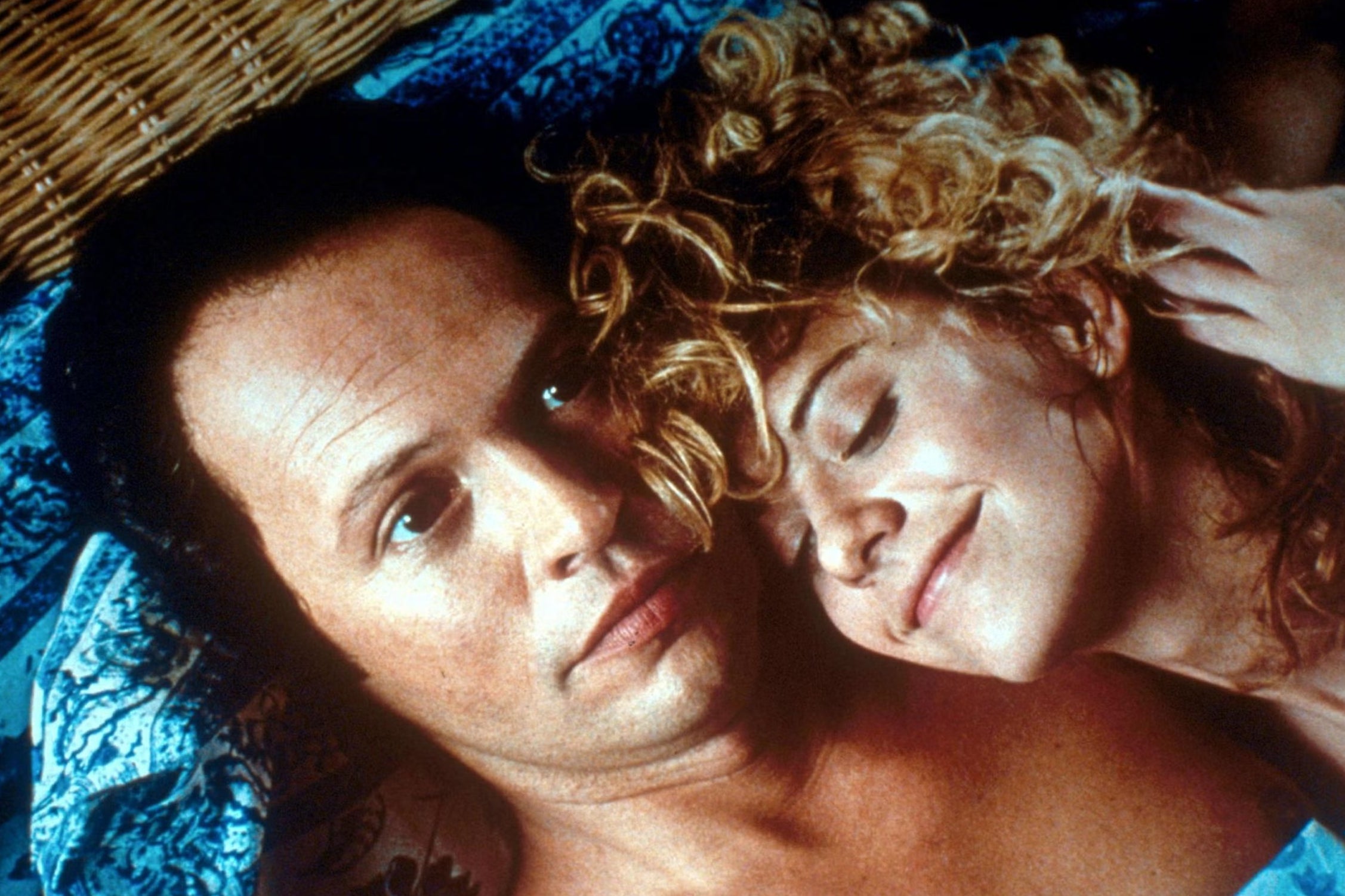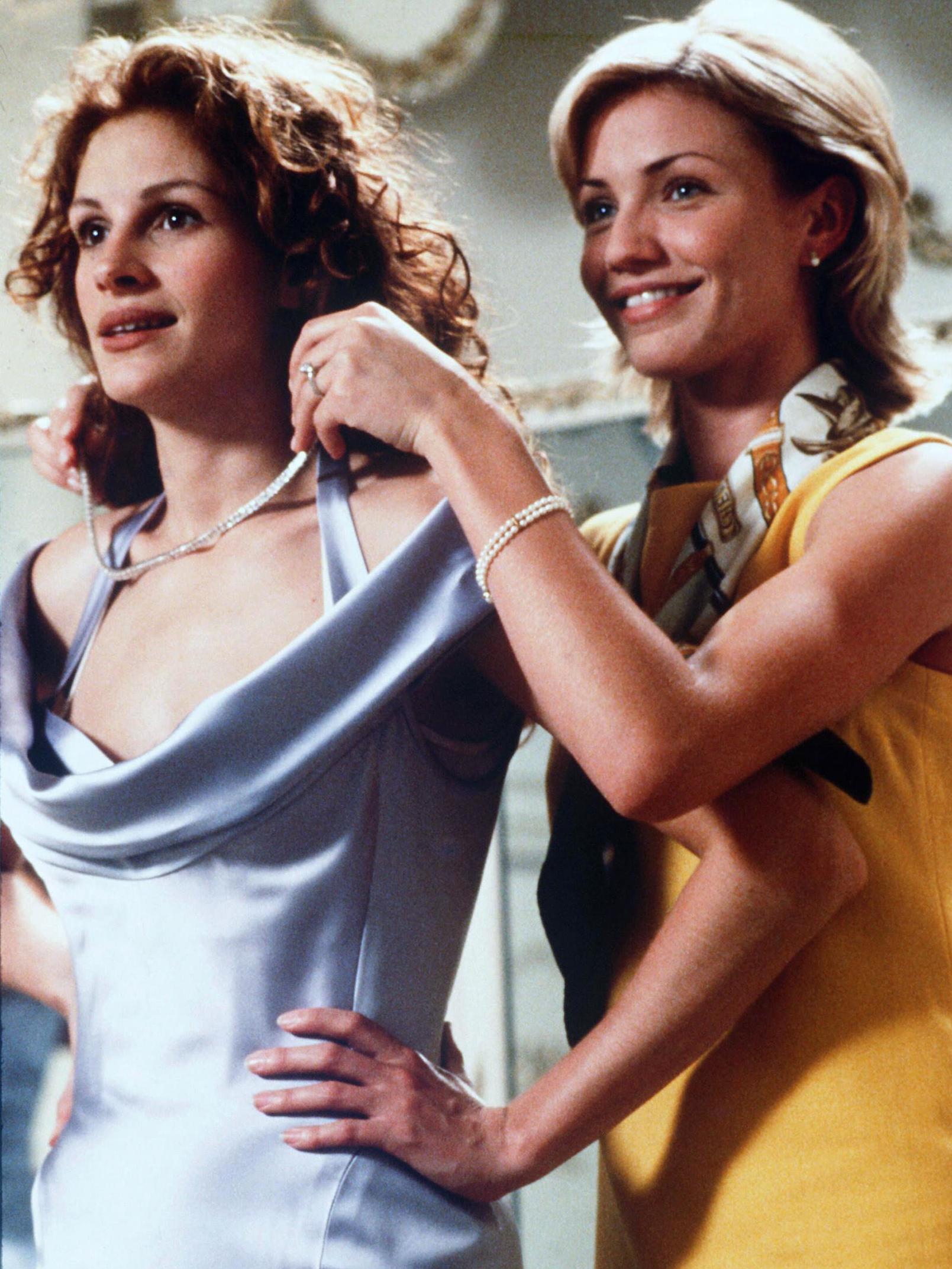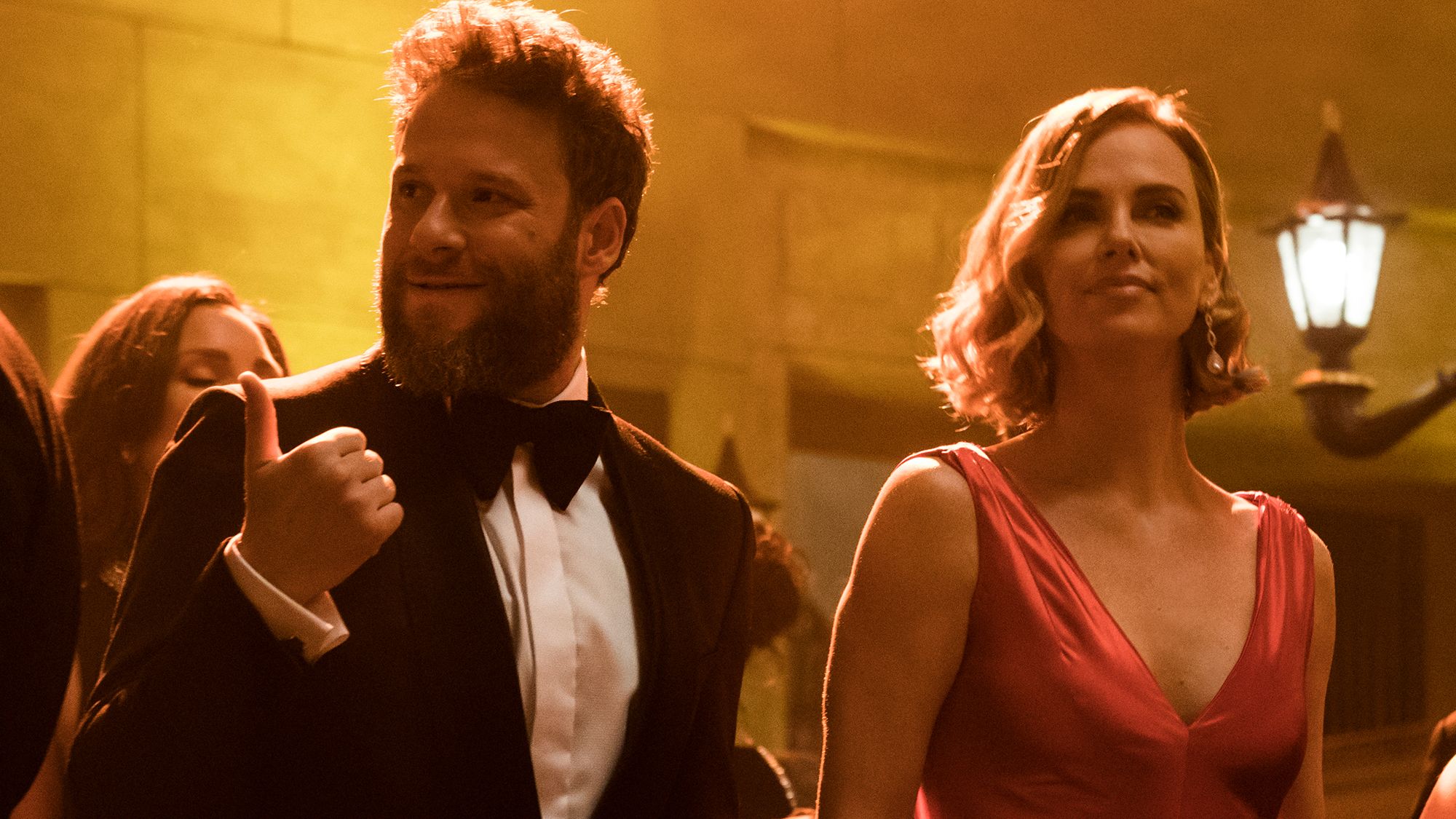The Independent's journalism is supported by our readers. When you purchase through links on our site, we may earn commission.
‘I love romantic comedies but they’re awful, aren’t they?’ – Why we’re still head over heels for the romcom, despite their toxicity
A new documentary explores the genre that birthed Meg Ryan, decades of self-loathing and large tubs of ice cream eaten sadly on the sofa, writes Adam White


Your support helps us to tell the story
From reproductive rights to climate change to Big Tech, The Independent is on the ground when the story is developing. Whether it's investigating the financials of Elon Musk's pro-Trump PAC or producing our latest documentary, 'The A Word', which shines a light on the American women fighting for reproductive rights, we know how important it is to parse out the facts from the messaging.
At such a critical moment in US history, we need reporters on the ground. Your donation allows us to keep sending journalists to speak to both sides of the story.
The Independent is trusted by Americans across the entire political spectrum. And unlike many other quality news outlets, we choose not to lock Americans out of our reporting and analysis with paywalls. We believe quality journalism should be available to everyone, paid for by those who can afford it.
Your support makes all the difference.Filmmaker and musician Elizabeth Sankey grew up immersed in the romcom’s golden age, an era of cinema built on Melanie Griffith’s Working Girl shoulder pads and Andie MacDowell not noticing it’s raining. But as she grew up, got married and looked back on her own relationship with the films that taught her how to love, pine and generally be, she realised how toxic many of them were, and how often they taught her the wrong lessons.
“I had this revelation after I got married that there were loads of things about them that are deeply problematic,” she says. “I realised, ‘Oh my god, most people see these films as fantasy, but I’ve been treating them like reality, or like a blueprint or a roadmap to how to behave in a relationship.’ And that’s really troubling.”
Sankey’s new documentary, Romantic Comedy, further deconstructs the genre that she adores and abhors in equal measure. Alongside a heavenly selection of clips from hundreds of romcoms throughout film history, a dreamy score composed by Sankey’s band Summer Camp and the voices of contributors including music journalist Laura Snapes and film critic Simran Hans, Sankey recalls her own journey as a romcom obsessive and her gradual awareness of the genre’s heteronormativity, their near-universal whiteness and their ubiquitous portrayals of absurdly wealthy individuals.
Then there are “the rules” that a female character in a romcom must follow, of which Sankey says she spent far too much time emulating in her younger years. Sankey says in the film: “She must always be laid back, easy going and fun. If you think you hate someone, that might actually mean they’re perfect for you. And true relationship success is achieved by one thing and one thing only – a big, white wedding.”
Romantic comedies often double as monster movies, their messaging destructive and insidious and their tropes well-known. In romcoms, everyone is rich and television is for the lonely – endlessly tuned to black and white movies, single women captured unflatteringly in their hazy glow. Women in business are also women in need of male salvation. Jobs in media, architecture or PR are all that there is. And if anyone works in retail, it’s less in a supermarket and more in a darling independent bookstore lit by lamps and filled with the sounds of Meg Ryan tapping the keys on her Windows ’98. Black women, queer people and Rita Wilson tend to be little more than parts of Greek choruses on the sidelines of their straight white friends’ love stories. The Shrink Is In, a forgotten 2001 romcom starring then-couple Courteney Cox and David Arquette, is only at all notable today because Cox’s requisite “black best friend”, there to offer pat wisdom and utter the occasional “mmm-hmm, girlfriend”, is none other than a pre-fame Viola Davis.
And even in the (rarer) romantic comedies that spotlight black actors, like Boomerang, Two Can Play That Game or most of Sanaa Lathan’s filmography, characters still operate within rarefied worlds of upscale restaurants, luxury penthouses and designer clothing. Queer romcoms like Saving Face or Imagine Me & You – the former, one of the rare romcoms to feature Asian characters of any sexuality – are similarly driven by well-heeled protagonists.
But, in spite of their many faults, romcoms are also irresistible bad things, oozing with aesthetic charm, shiny optimism and fairytale endings. They are comfortable and comforting, resolutely safe and filled with perky actors with enviable teeth and perfect skin. There’s additionally an argument to be made that they appeal to the sides of ourselves that we don’t like to say we have – a secret wanting to be beautiful, or a desire for an expensive wardrobe, or to fit a certain body type. And because we know it’s generally considered uncouth to want such things, we performatively reject them, all the while secretly wishing we worked at Poise Magazine à la Jennifer Garner in 13 Going on 30, or lived in Notting Hill and proved irresistible to the most famous movie star in the world.
No other film genre inspires such guilt in its audience. Michael Bay movies, or Jackass, or things with Dwayne Johnson in them are elevated to a kind of ironic glory, enjoyed for “what they are” rather than things worthy of shame, while their critical reviews rarely comprise the flamboyant vitriol levelled at your average Jennifer Aniston vehicle. And it’s left a mark in terms of how we treat them, all the sadder because of how dominated the genre is by women in front of and behind the camera, and what it says about our relationship with stories that are recognised as particularly feminine. To quote Emily Nussbaum’s stunning New Yorker essay on the legacy of Sex and the City in 2013, “[there is an] assumption that everything stylised, formulaic, pleasurable, funny or feminine… must be inferior”.

“When I would tell women that I was making this film, they’d say, ‘Oh my god, I love romantic comedies but they’re awful, aren’t they?’ And there was so much back and forth and feelings of discomfort about them,” Sankey recalls. And she admits to having had those feelings herself. “I had a lot of internalised misogyny about them in terms of feeling like, ‘I’m a feminist, I can’t like these, they’re silly, it’s women’s stuff’. Like, ‘Oh no, I don’t want to be the kind of woman who goes with her girlfriends to watch romantic comedies – that’s deeply embarrassing, I’m not that kind of woman, I’m intelligent, I’m cultured, I read!’ And feeling ashamed about that side of myself.”

Watch Apple TV+ free for 7 days
New subscribers only. £8.99/mo. after free trial. Plan auto-renews until cancelled

Watch Apple TV+ free for 7 days
New subscribers only. £8.99/mo. after free trial. Plan auto-renews until cancelled
For those who do love them – their inherent horror notwithstanding – they will always be defended. Part of the intrigue in watching Romantic Comedy is how it compels you to address your own relationship with the genre, and how eager you are to excuse many of their worst qualities. And that’s not even reserved for the genre’s A-list entries, among them: When Harry Met Sally, My Best Friend’s Wedding or most things written by Nora Ephron, Richard Curtis or Nancy Meyers. Instead you find yourself bending over backwards to defend the likes of the sociopathic Sandra Bullock vehicle While You Were Sleeping, or the vaguely cruel star-crossed lovers in the otherwise blissful John Cusack/Kate Beckinsale movie Serendipity.
“I think the power they have is really primal,” Sankey says. “I know that regardless of how bizarre the premise is, of how problematic they are, or whatever happens in them, I will still find myself moved by the longing and the unexpressed desire. I’ve always had a very strong emotional reaction to that, and I think because falling in love is the most magical thing human beings experience, you can find yourself in these films regardless of all of the strange things about them. And that’s why they’re so special.”
It might also be because the romcom has become a cinematic rarity. Often wordy and small-scale, romantic comedies don’t particularly travel well overseas. The post-Katherine Heigl generation of young, blonde and likeable female actors have chosen instead to make Oscar bait and weirdo arthouse indies rather than their own romantic comedy vehicles – so predisposed as they are to typecasting. And when they do arrive in cinemas, most recently via the woke, adorable Seth Rogen/Charlize Theron romcom Long Shot (aka the secret masterpiece of 2019 in film), they are by and large snubbed by audiences. Instead, they’ve found a home on television, in Netflix movies like Set It Up and Always Be My Maybe, or on series like The Mindy Project, Lovesick and the forthcoming Mindy Kaling-produced TV reboot of Four Weddings and a Funeral.
Regardless of how bizarre the premise is, of how problematic they are, or whatever happens in them, I will still find myself moved by the longing and the unexpressed desire
And just as the romcom has fallen out of cinema, so too has the archetypal romcom heroine beloved by audiences, and responsible for transforming the likes of Julia Roberts or Reese Witherspoon into stars. Rather, our new icons of fictional female empowerment tend to be villains or women of fascinating complexity, who like to ridicule and deconstruct the media-driven images of attractive heteronormative perfection rather than buy into them. Amy Dunne’s “Cool Girl” speech in Gone Girl, about the looks, behaviours and interests heterosexual women are expected to embody in order to appear attractive to boorish men, could easily have been a response to any number of Cameron Diaz movies.
“I think a lot of women are really angry and feel very badly represented,” Sankey says. “And that’s why it’s really delicious to see these characters who are villainous, [Killing Eve’s] Villanelle for example, or even in something like The Handmaid’s Tale, the fact that [Elisabeth Moss’s character] is leaning into that horrible situation and fighting and biting down and getting on with it, there’s something really liberating and exciting about that.
“Mainly because it’s just characters that we haven’t seen before, who are female and complex and problematic in terms of how they treat other people. Especially because in romantic comedies a woman’s problem tends to be, ‘Oh, she’s really clumsy!’. I remember as a teenager feeling like I couldn’t tell my boyfriend if he’d done something that had upset me, and I had this rage building inside me because of it, and I think these new characters are definitely a response to that feeling of frustration that a lot of women have felt about how they’re represented in films and TV. For me it’s really exciting.”

Which isn’t to say, Sankey insists, that the romcom as we knew it is over, or that women on screen need to be broken, cold or have a needle sticking into their arm in order to be progressive or “better” than the neurotic, unlucky-in-love career women Jennifer Lopez plays every few years. They just need to be more representative, and more in touch with what women today feel, want and look like.
“I understand the instinct to say romantic comedies are too saccharine or that we’ve gone through the mill in terms of making them saccharine, so now what we need to do is make them darker or more complex,” she explains. “But I don’t think that’s the only thing you can do with them. You can keep them upbeat and aspirational and beautiful, you just need to have characters who aren’t white, straight and middle class. I just think that’s the way that you do it, and that’s how you inject life into it.”
As long as there is love and longing and perky young actors Hollywood is eager to turn into stars, there will be romcoms. But in 2019, they don’t always need to be about the same kinds of people.
Romantic Comedy is playing as part of The LOCO London Comedy Film Festival 2019, which takes place 11-14 July 2019 at BFI Southbank http://locofilmfestival.com/
Join our commenting forum
Join thought-provoking conversations, follow other Independent readers and see their replies
Comments